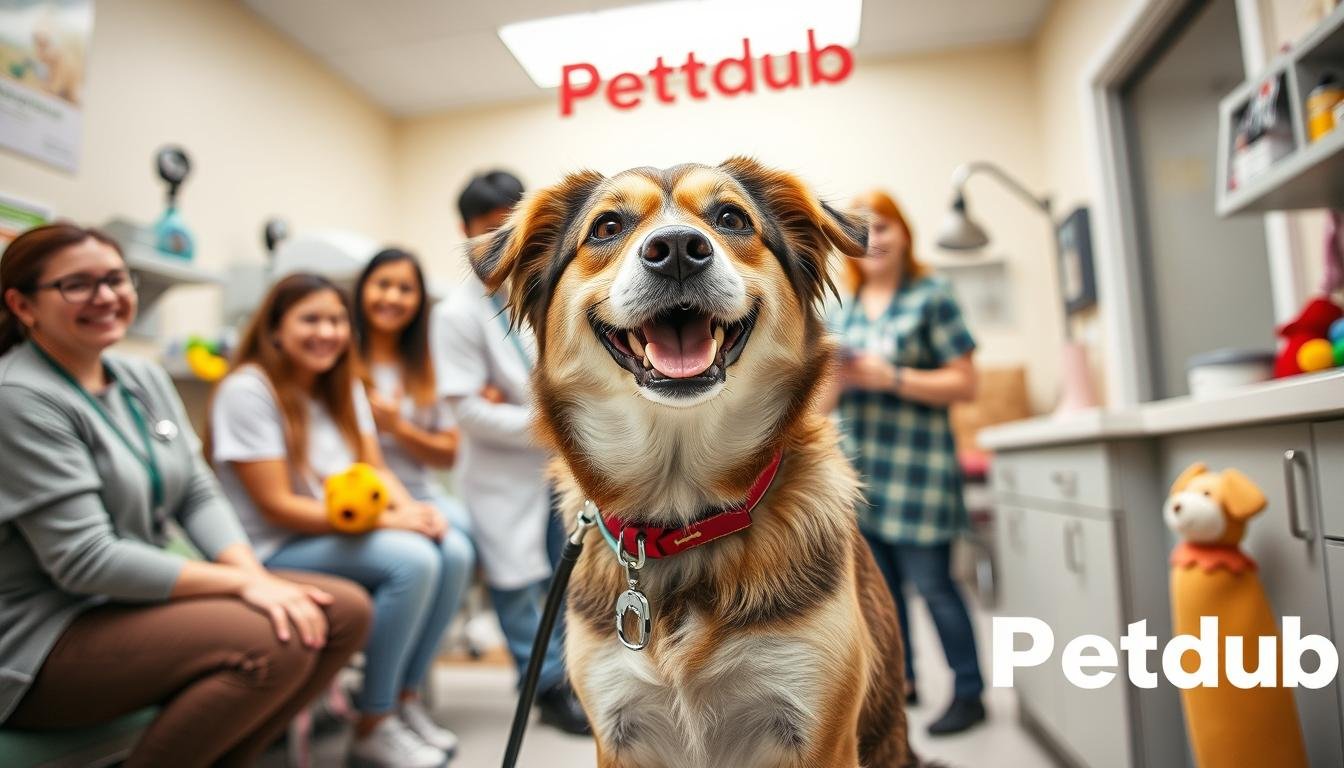Did you know the global pet care market is set to hit $358.62 billion by 2027? This shows how vital it is to care for our dogs’ health. We’ll cover key dog health care tips to keep your pet happy and healthy. Topics include vet visits, nutrition, exercise, and grooming.
Key Takeaways
- Importance of regular veterinary checkups for early detection and prevention of health issues
- Proper nutrition and a balanced diet to support your dog’s overall well-being
- Essential vaccinations to protect your canine friend from various diseases
- Maintaining good dental hygiene through professional cleanings and at-home care
- Effective flea and tick prevention to keep your dog safe from pests and parasites
The Importance of Regular Veterinary Checkups
Keeping your dog healthy is crucial. Regular vet visits are key to this. They help find problems early, so your dog can get the right treatment fast.
Preventive Care: Detecting Issues Early
Preventive care is vital for dog owners. At vet checkups, your vet does a full exam and screens for health issues. This early action leads to a healthier, happier life for your dog.
Building a Relationship with Your Veterinarian
Having a good vet relationship is as important as the visits. Regular vet visits help build trust and teamwork. Your vet will know your dog’s needs and history, giving them the best care.
Regular vet visits are key for dog owners. They help find problems early, support preventive care, and build a strong vet relationship. By making these visits a priority, you ensure your dog stays healthy and happy for life.
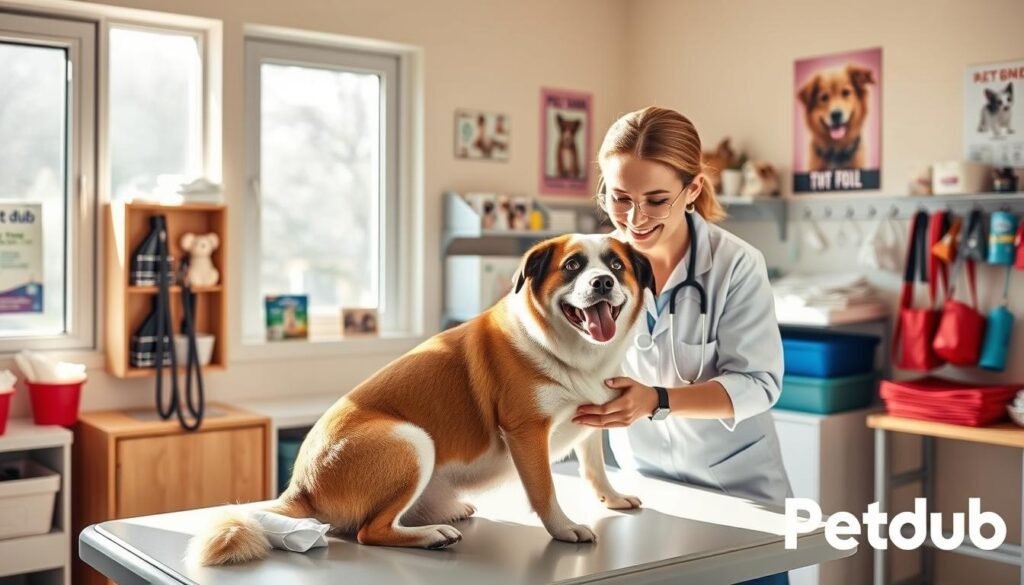
“Preventive care is the key to keeping your dog healthy and happy for years to come.”
| Benefit | Description |
|---|---|
| Early Detection | Regular checkups allow your veterinarian to identify potential health issues before they become more serious, enabling prompt treatment and better outcomes. |
| Preventive Measures | Veterinary visits provide opportunities to discuss and implement preventive care strategies, such as vaccinations, parasite control, and nutrition. |
| Personalized Care | Building a relationship with your vet helps them understand your dog’s unique needs, leading to more tailored and effective healthcare solutions. |
Nutritious Diet for a Healthy Dog
It’s vital to give your dog a balanced diet for their health. A good canine nutrition plan helps them stay healthy and full of energy. Let’s look at what makes a healthy dog food plan.
Protein is key for dogs, helping with muscles, organs, and the immune system. Choose high-quality protein like lean meats, fish, and eggs. They should be a big part of your dog’s balanced diet.
Fats are also important, giving energy and helping vitamins get absorbed. Healthy fats from fish oils, flaxseeds, and plant-based oils make coats shiny and skin soft.
Carbohydrates, in small amounts, offer fiber and energy. Add whole grains, veggies, and fruits to their diet for these benefits.
| Nutrient | Function | Best Sources |
|---|---|---|
| Protein | Muscle development, organ function, immune system | Lean meats, fish, eggs |
| Fats | Energy, vitamin absorption, coat and skin health | Fish oils, flaxseeds, plant-based oils |
| Carbohydrates | Fiber, complex sugars, energy | Whole grains, vegetables, fruits |
A balanced diet also needs vitamins and minerals. These help with bone health and brain function. Talk to your vet to make sure your dog gets what they need from dog food or homemade meals.
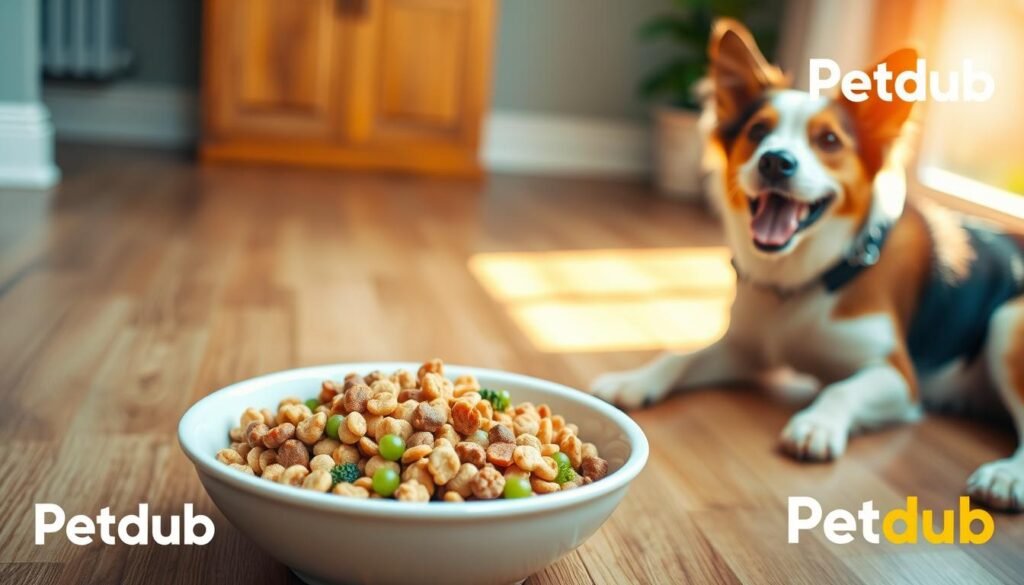
Feeding your dog a nutritious diet helps them stay healthy and happy. A balanced canine nutrition plan is the key to their well-being. It sets them up for a long, active life.
Essential Vaccinations for Canine Health
Keeping your pet healthy is a top priority, and pet vaccinations play a crucial role in protecting your furry friend. Vaccines expose your dog’s immune system to weakened or inactivated forms of diseases. This allows their body to build antibodies and develop resistance. It safeguards your pet against potentially life-threatening illnesses.
Core Vaccines for Dogs
Core vaccines are essential for all dogs, no matter their lifestyle or location. These core vaccinations include:
- Rabies
- Distemper
- Parvovirus
- Adenovirus
- Coronavirus
These core pet vaccinations protect your dog against severe and prevalent diseases. Ensuring your dog gets these core vaccines is crucial for their health and well-being.
Non-Core Vaccines: When They’re Needed
There are also non-core vaccines that may be recommended for your dog. These depend on your dog’s lifestyle, location, and risk factors. Some common non-core vaccines include:
- Bordetella (kennel cough)
- Leptospirosis
Canine Influenza
- Lyme disease
Your veterinarian will assess your dog’s needs and recommend the right non-core vaccines. By working with your vet, you can ensure your dog gets the vaccinations they need to stay healthy and thrive.

Dog Dental Care: Maintaining a Healthy Smile
Good dog dental care is key for your dog’s health. Many pet owners forget this, leading to serious dental problems. We’ll look at dental signs in dogs and how to care for their teeth at home and with vet teeth cleaning.
Signs of Dental Issues in Dogs
Spotting dental problems early is vital. Look out for:
- Bad breath
- Excessive drooling
- Difficulty eating or chewing
- Discolored or tartar-covered teeth
- Reddened or swollen gums
If you see these signs, get your dog to the vet fast.
Professional Teeth Cleaning and At-Home Care
Professional teeth cleaning by a vet is crucial. It removes plaque and tartar, preventing gum disease. At home, brush your dog’s teeth with pet-safe toothpaste and give dental chews or toys.
- Brushing your dog’s teeth with a soft-bristled toothbrush and pet-safe toothpaste
- Providing dental chews or toys that help scrape away plaque and tartar
- Feeding a diet formulated for dental health
Combining vet care with at-home care keeps your dog’s teeth healthy and happy.
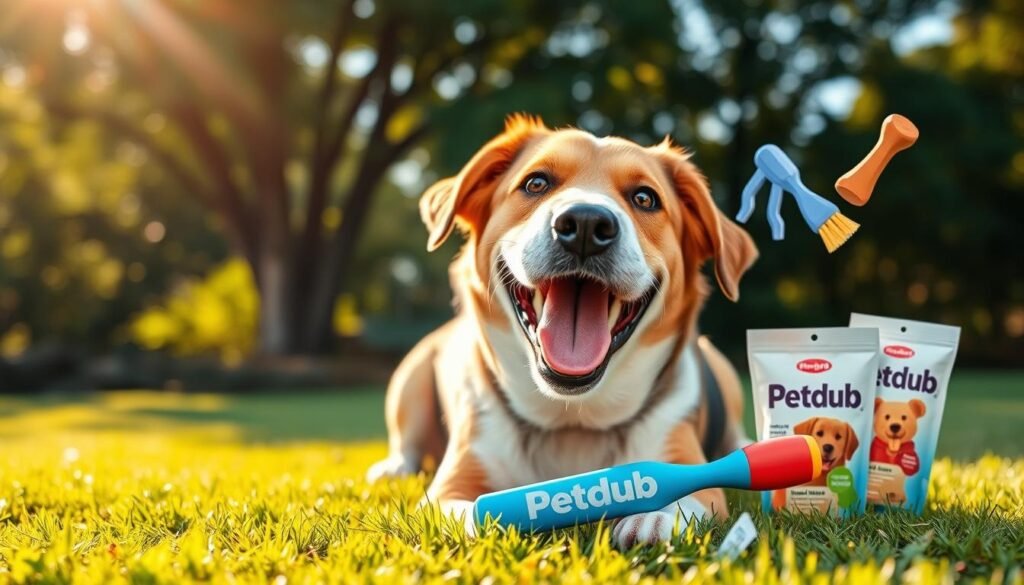
Flea and Tick Prevention: Keeping Pests at Bay
Keeping your dog safe from fleas, ticks, and parasites is key. These pests can make your dog uncomfortable and even sick. They can spread diseases that harm your dog’s health.
There are many ways to stop these pests from bothering your dog. You can use topical treatments, oral medications, or clean your home. We’ll look at these options to keep your dog safe and happy.
Topical Treatments for Flea and Tick Prevention
Topical treatments are a popular choice for protecting dogs. These spot-on solutions are applied to your dog’s skin. They create a barrier that keeps fleas and ticks away. Choose products with fipronil, selamectin, or imidacloprid for the best results.
Oral Medications for Parasite Protection
Oral medications are another option for keeping your dog safe. These chewable tablets or flavored supplements stop fleas and ticks from reproducing. Talk to your vet to find the right oral medication for your dog.
Environmental Control Measures
Keeping your home clean is also important for flea and tick prevention. Vacuum and wash your dog’s bedding often. Treat carpets, furniture, and outdoor areas where pests might hide. Use insect growth regulators or natural repellents to get rid of pests.
By using a combination of methods, you can keep your dog healthy and happy. This way, your dog won’t have to deal with the discomfort and health risks of fleas and ticks.
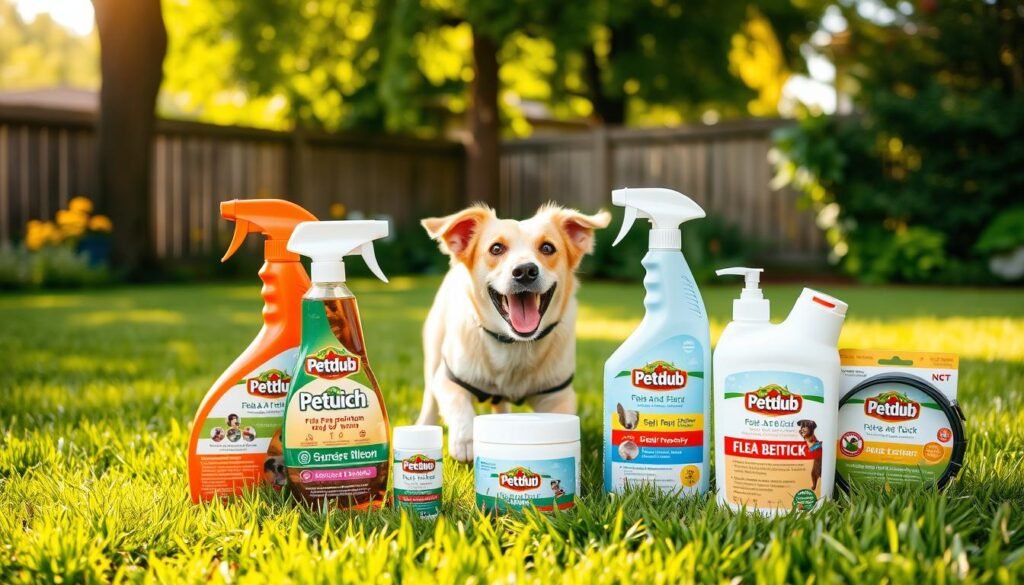
Dog Grooming: More Than Just Looking Good
Regular dog grooming is key to keeping your furry friend healthy and happy. It’s not just about looks. A good grooming routine can greatly improve your dog’s life.
Benefits of Regular Grooming
Proper grooming offers many benefits for your dog. Brushing, bathing, and trimming remove dirt and keep their coat and skin healthy. It also helps spot any health issues early.
Grooming is a great way to bond with your dog. It strengthens your relationship and makes grooming a positive experience.
Grooming Tips for Different Dog Breeds
Different dog breeds have different grooming needs. Long-haired breeds like poodles need more brushing and trimming. Short-haired breeds like Labradors need less grooming.
Knowing your dog’s breed grooming needs is important. It helps keep them healthy and happy.
| Dog Breed | Grooming Needs |
|---|---|
| Poodle | Frequent brushing, regular trimming, and professional grooming every 4-6 weeks |
| Labrador Retriever | Occasional bathing, light brushing, and professional grooming as needed |
| Shih Tzu | Daily brushing, regular trimming, and professional grooming every 4-6 weeks |
| Greyhound | Occasional bathing, light brushing, and professional grooming as needed |
Understanding your dog’s grooming needs is crucial. A regular grooming routine tailored to their breed ensures they stay healthy and look great.
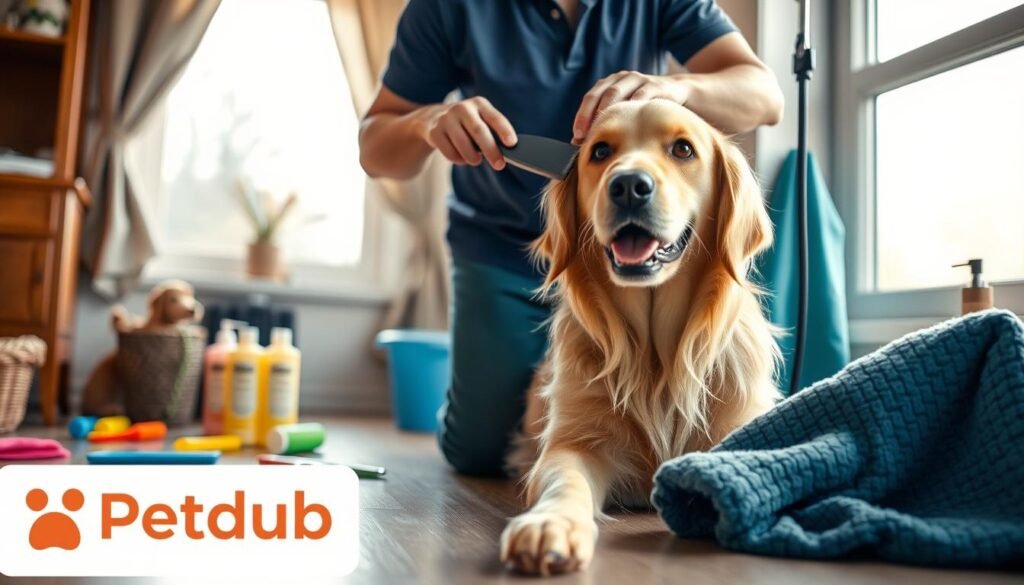
“Grooming is an essential part of responsible dog ownership and contributes to the overall health and well-being of our canine companions.”
Dog Health Care: Keeping Them Active
Keeping your dog active is key for their health and happiness. Dogs need regular exercise to stay fit. The right amount and type of activity depends on their age and breed.
Exercise Routines for Different Ages and Breeds
Puppies and young dogs are full of energy and need lots of play. Older dogs might need less intense activities to avoid injuries. It’s also important to consider breed-specific exercise needs.
- Puppies and young dogs: Aim for at least 30 minutes of playtime or a brisk walk per day, along with opportunities for free play and exploration.
- Adult dogs: Most breeds require 1-2 hours of daily exercise, including a combination of walks, playtime, and mentally stimulating activities.
- Senior dogs: Reduced exercise routines, such as short, gentle walks or low-impact activities like swimming, can help maintain their health and prevent joint issues.
Finding the right balance of dog exercise and physical activity is crucial. Talk to your vet or a trainer to create a plan that suits your dog’s needs. This will help them stay healthy and active all their life.
“Regular exercise is essential for a dog’s overall health and well-being. It helps maintain a healthy weight, strengthen the cardiovascular system, and support mental stimulation.”
Senior Dog Care: Addressing Aging Needs
As our dogs get older, their health needs change. At this time, senior dog care is key. It’s vital to adjust our care to help them live their best years.
Common Health Issues in Senior Dogs
Older dogs face many health problems. These include arthritis, cognitive decline, dental disease, and a higher risk of cancer. Regular vet visits are important to catch these issues early and treat them.
Adapting Care for Elderly Canine Companions
Caring for a senior dog needs a detailed plan. This might include:
- Creating a gentle exercise routine to keep muscles and joints healthy
- Changing their diet to meet their nutritional needs
- Keeping their teeth clean to avoid pain
- Using supplements, like for joint health, to improve their life
- Modifying the home to make it easier for them to move around
By changing our care for senior dog care, we can help them age well. This way, they can enjoy their golden years fully.
Dog First Aid: Being Prepared for Emergencies
Having a dog is rewarding, but it also means being ready for health emergencies. Knowing basic first aid can help a lot until you see a vet.
Essential First Aid Supplies for Dog Owners
It’s important to have a good first aid kit for your dog. Here are key items every dog owner should have:
- Gauze pads and rolls to stop bleeding and protect wounds
- Antiseptic wipes to clean and disinfect injuries
- Bandages and tape to secure dressings and wraps
- Digital thermometer to monitor your dog’s temperature
- Tweezers for removing splinters or ticks
- Hydrogen peroxide to induce vomiting (only if instructed by a vet)
- Emergency blanket to keep your dog warm and dry
- Pet-safe pain medication (with veterinary approval)
Having these dog first aid supplies ready can help you act fast in an emergency. Learn how to use them and think about taking a pet first aid course.
“Being prepared can make all the difference in an emergency situation. Having the right first aid supplies on hand and knowing how to use them can help save your dog’s life.”
Responsible Pet Ownership: Our Role in Dog Health Care
As dog owners, we have a big role in keeping our pets healthy and happy. Responsible pet ownership means more than just loving our dogs. It also means making smart choices about their health care.
Being a responsible dog owner means caring for our pets for their whole lives. This includes giving them a safe home, following local rules, and controlling the pet population. It also means making sure they get regular vet visits, shots, and protection from pests like fleas and ticks.
It’s also important to socialize our dogs and keep them active. As they get older, we need to adjust their care to meet their changing needs. This helps them stay comfortable and happy in their golden years.
“Responsible pet ownership is not just a privilege, but a duty we must uphold to ensure the well-being of our four-legged friends.”
By being responsible dog owners, we can make the world a better place for our pets and our communities. Our commitment to responsible pet ownership sets a good example. It encourages others to care for their pets in the same way, making a big difference in the lives of dogs and their owners.
Caring for Senior Pets: Expert Health Tips & Advice
Conclusion
By following the dog health care tips in this guide, we can help our dogs live long, happy lives. Taking care of our furry friends is a big job, but it’s worth it. Seeing them happy and healthy is the best reward.
We’ve covered key parts of dog health care and canine wellness. This includes regular vet visits, a healthy diet, and important vaccinations. We also talked about how to keep their teeth clean.
Our dogs count on us to make good choices and take care of them. By using the tips from this article, we can be great pet owners. This way, our dogs can have a great life at every stage.

